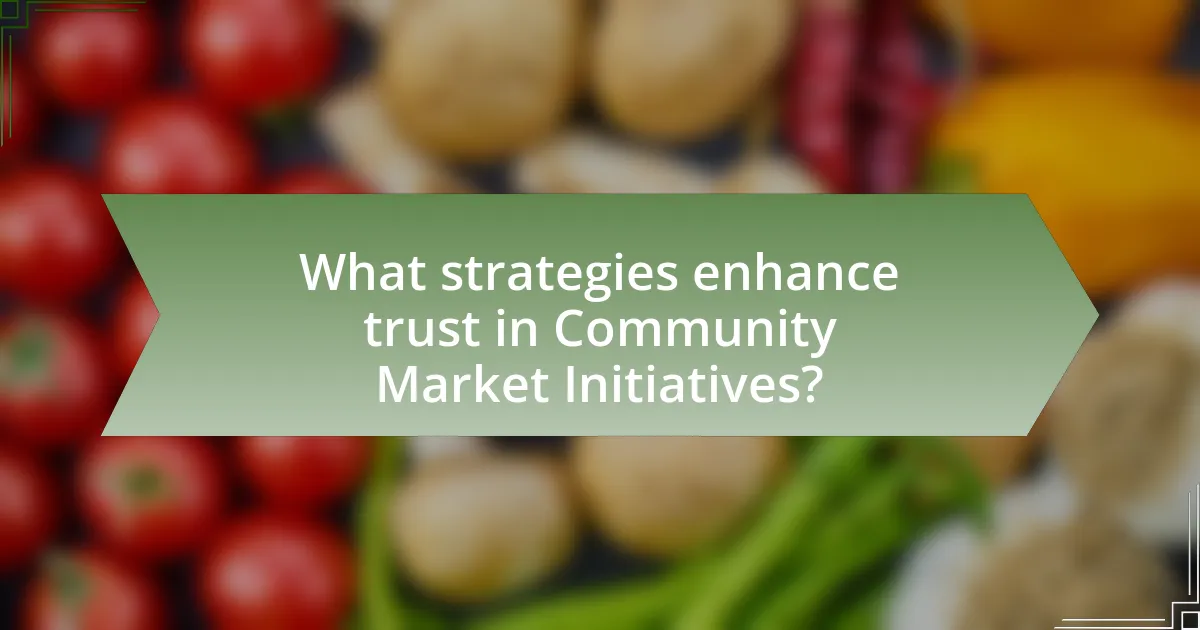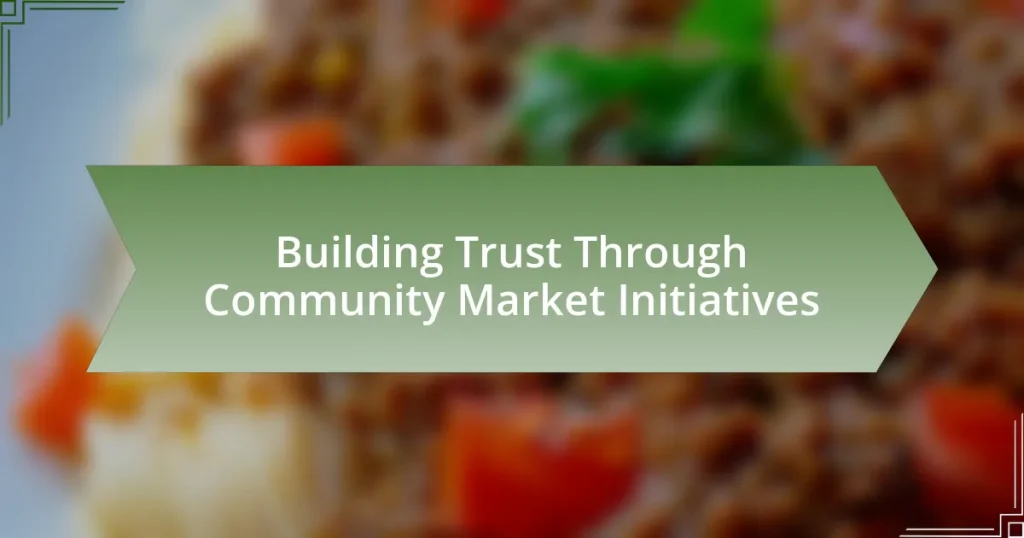Community Market Initiatives are programs aimed at enhancing local economies through the promotion of goods and services exchange within communities. These initiatives focus on supporting local businesses, fostering relationships among community members, and encouraging sustainable practices. Key components include local engagement, transparency, and equitable access, which collectively build trust among participants. The article explores how these initiatives function, their importance in local economies, and the strategies that enhance trust, such as consistent communication and accountability. Additionally, it addresses challenges faced in trust-building and highlights best practices for effective implementation, drawing on successful case studies to inform future initiatives.

What are Community Market Initiatives?
Community Market Initiatives are programs designed to enhance local economies by promoting the exchange of goods and services within a community. These initiatives often focus on supporting local businesses, fostering relationships among community members, and encouraging sustainable practices. For example, community-supported agriculture (CSA) programs allow consumers to buy shares of local farms, directly linking producers and consumers while strengthening community ties. Research indicates that such initiatives can lead to increased local spending, with studies showing that for every $100 spent at local businesses, approximately $68 stays within the community, compared to only $43 for non-local businesses.
How do Community Market Initiatives function?
Community Market Initiatives function by creating localized platforms where producers and consumers can engage directly, facilitating the exchange of goods and services. These initiatives often operate through farmers’ markets, cooperatives, or community-supported agriculture programs, which emphasize transparency and trust between participants. For example, a study by the USDA found that direct marketing channels, such as farmers’ markets, can increase consumer trust in food sources by allowing them to interact with producers directly, thereby enhancing community relationships and supporting local economies.
What are the key components of Community Market Initiatives?
The key components of Community Market Initiatives include local engagement, sustainable practices, and equitable access. Local engagement fosters community participation and ownership, ensuring that initiatives reflect the needs and values of the community. Sustainable practices focus on environmentally friendly methods that support long-term viability, such as sourcing local products and reducing waste. Equitable access ensures that all community members, regardless of socioeconomic status, can participate in and benefit from the market, promoting inclusivity and social equity. These components work together to build trust and strengthen community ties, ultimately enhancing the effectiveness of the initiatives.
How do these components interact to build trust?
Components such as transparency, communication, and shared values interact to build trust within community market initiatives. Transparency fosters openness, allowing stakeholders to understand processes and decisions, which reduces uncertainty and builds confidence. Effective communication ensures that all parties are informed and engaged, facilitating collaboration and addressing concerns promptly. Shared values create a sense of belonging and alignment among community members, reinforcing commitment to collective goals. Together, these components create a supportive environment where trust can flourish, evidenced by studies showing that communities with high levels of transparency and communication report stronger trust in local initiatives.
Why are Community Market Initiatives important for trust-building?
Community Market Initiatives are important for trust-building because they foster direct relationships between producers and consumers, enhancing transparency and accountability. These initiatives create a platform where community members can engage with local businesses, leading to a shared understanding of values and practices. Research indicates that when consumers know the source of their products and can interact with producers, it increases their confidence in the quality and ethical standards of those products. For example, a study by the University of California found that consumers who participated in community-supported agriculture programs reported higher levels of trust in the food they purchased, as they had direct access to information about farming practices and product origins. This direct engagement not only strengthens community ties but also cultivates a culture of mutual respect and reliability among participants.
What role do they play in local economies?
Community market initiatives play a crucial role in local economies by fostering economic resilience and promoting local entrepreneurship. These initiatives create platforms for local producers to sell their goods, which stimulates demand for locally sourced products and keeps money circulating within the community. According to a study by the American Independent Business Alliance, local businesses recirculate a greater share of every dollar as they create locally owned supply chains and invest in their employees. This recirculation leads to job creation and strengthens community ties, ultimately enhancing the overall economic stability of the area.
How do they foster relationships among community members?
They foster relationships among community members by organizing regular community market events that encourage interaction and collaboration. These events provide a platform for local vendors and residents to engage, share resources, and build networks. Research indicates that community markets enhance social cohesion by creating opportunities for face-to-face communication, which strengthens trust and mutual support among participants. For example, a study by the Community Development Society found that such initiatives lead to increased community engagement and a sense of belonging, as members feel more connected through shared experiences and local economic activities.

What strategies enhance trust in Community Market Initiatives?
Strategies that enhance trust in Community Market Initiatives include transparency, community engagement, and consistent communication. Transparency involves openly sharing information about sourcing, pricing, and decision-making processes, which fosters accountability and builds credibility among participants. Community engagement encourages active participation from local stakeholders, allowing them to voice concerns and contribute to the initiative’s direction, thereby creating a sense of ownership and trust. Consistent communication ensures that all parties are informed about developments, changes, and successes, reinforcing reliability and trustworthiness. Research indicates that these strategies significantly improve participant satisfaction and loyalty, as evidenced by a study published in the Journal of Community Development, which found that initiatives employing these strategies reported a 30% increase in community trust levels.
How can transparency be achieved in these initiatives?
Transparency in community market initiatives can be achieved through clear communication of goals, processes, and outcomes. By providing stakeholders with accessible information about decision-making processes, financial transactions, and project impacts, initiatives foster trust and accountability. For instance, regular public reports and community meetings can ensure that all participants are informed and engaged, thereby enhancing transparency. Studies show that initiatives with transparent practices tend to have higher levels of community participation and satisfaction, as evidenced by the success of various cooperative models that prioritize open dialogue and shared information.
What practices promote open communication?
Practices that promote open communication include active listening, transparency, and regular feedback. Active listening ensures that individuals feel heard and valued, fostering an environment where they are more likely to share their thoughts. Transparency in sharing information builds trust, as stakeholders are kept informed about decisions and changes. Regular feedback mechanisms, such as surveys or open forums, encourage ongoing dialogue and allow for the adjustment of communication strategies based on community needs. These practices are supported by research indicating that organizations with high levels of open communication experience increased employee engagement and satisfaction, leading to more effective community initiatives.
How does accountability contribute to trust?
Accountability fosters trust by ensuring that individuals or organizations take responsibility for their actions and decisions. When people are held accountable, they are more likely to act transparently and ethically, which builds confidence among stakeholders. Research indicates that organizations with strong accountability mechanisms experience higher levels of trust from employees and customers, as they perceive a commitment to integrity and reliability. For example, a study published in the Journal of Business Ethics found that accountability positively correlates with trust in organizational settings, demonstrating that when leaders are accountable, it enhances the overall trust climate within the organization.
What role does community engagement play in trust-building?
Community engagement plays a crucial role in trust-building by fostering open communication and collaboration between individuals and organizations. When community members actively participate in decision-making processes, they feel valued and heard, which enhances their trust in the entities involved. Research indicates that communities with higher levels of engagement report increased trust in local institutions, as seen in a study by the National Civic League, which found that participatory governance leads to stronger relationships between citizens and government. This trust is essential for the success of community market initiatives, as it encourages cooperation and collective action towards shared goals.
How can community feedback be effectively integrated?
Community feedback can be effectively integrated by establishing structured channels for communication, such as surveys, focus groups, and online forums. These channels allow community members to share their insights and experiences, which can then be systematically analyzed to inform decision-making. For instance, a study by the International Association for Public Participation found that communities that actively engage in feedback mechanisms see a 30% increase in trust and satisfaction with local initiatives. By utilizing these methods, organizations can ensure that community voices are heard and considered in the development of market initiatives, fostering a sense of ownership and collaboration.
What methods encourage active participation from community members?
Methods that encourage active participation from community members include organizing community meetings, creating participatory budgeting processes, and utilizing digital platforms for engagement. Community meetings foster direct communication and allow members to voice their opinions and ideas, which enhances their sense of belonging and investment in community initiatives. Participatory budgeting empowers members by giving them a say in how funds are allocated, leading to increased ownership and accountability. Digital platforms, such as social media and community forums, facilitate ongoing dialogue and provide accessible channels for feedback and collaboration, thus broadening participation. Research indicates that communities employing these methods often see higher levels of engagement and satisfaction among members, reinforcing the effectiveness of these strategies in building trust and participation.

What challenges do Community Market Initiatives face in building trust?
Community Market Initiatives face several challenges in building trust, primarily due to a lack of transparency, inconsistent communication, and varying stakeholder interests. Transparency issues arise when initiatives do not clearly share their processes, goals, and financial information, leading to skepticism among community members. Inconsistent communication can create confusion and mistrust, as stakeholders may feel uninformed or misled about the initiative’s activities and intentions. Additionally, differing interests among community members, local businesses, and external partners can complicate trust-building efforts, as conflicting priorities may hinder collaboration and mutual understanding. These challenges are critical, as trust is essential for the sustainability and effectiveness of Community Market Initiatives.
How can mistrust among community members be addressed?
Mistrust among community members can be addressed through transparent communication and collaborative initiatives. Establishing regular community meetings fosters open dialogue, allowing members to voice concerns and share experiences. Research indicates that communities with high levels of engagement in decision-making processes report increased trust levels; for instance, a study by the National Civic League found that participatory governance enhances trust by 30% in local communities. Additionally, implementing community market initiatives that encourage local participation and support can strengthen relationships, as evidenced by the success of farmers’ markets in promoting social cohesion and trust among vendors and consumers.
What are common misconceptions about Community Market Initiatives?
Common misconceptions about Community Market Initiatives include the belief that they primarily serve only low-income populations and that they lack sustainability. In reality, Community Market Initiatives are designed to benefit a diverse range of community members, fostering economic resilience and social cohesion. Additionally, many initiatives incorporate sustainable practices, such as local sourcing and environmental stewardship, which contribute to their long-term viability. Research from the Community Food Security Coalition indicates that these initiatives can enhance local economies and improve access to healthy food for all community members, not just those in need.
How can these misconceptions be overcome?
Misconceptions can be overcome through education and transparent communication within community market initiatives. By providing accurate information about the benefits and operations of these initiatives, stakeholders can address misunderstandings. For instance, studies show that community engagement and workshops significantly improve public perception and trust, as evidenced by the success of programs like the Community Supported Agriculture model, which fosters direct relationships between consumers and producers.
What external factors influence trust in Community Market Initiatives?
External factors that influence trust in Community Market Initiatives include community engagement, transparency, and external validation. Community engagement fosters relationships and encourages participation, which builds trust among stakeholders. Transparency in operations and decision-making processes allows participants to understand how the initiative functions, enhancing credibility. External validation, such as endorsements from reputable organizations or positive media coverage, reinforces trust by providing third-party assurance of the initiative’s integrity and effectiveness. These factors collectively contribute to a trustworthy environment for Community Market Initiatives.
How do economic conditions affect community trust?
Economic conditions significantly influence community trust by shaping perceptions of stability and security. When economic conditions are favorable, such as low unemployment and rising incomes, community members are more likely to trust each other and local institutions, as they feel secure in their livelihoods and future prospects. Conversely, during economic downturns, characterized by high unemployment and financial instability, trust tends to erode as individuals may become more self-interested and less willing to engage in cooperative behaviors. Research indicates that communities experiencing economic hardship often see increased social tensions and decreased participation in community activities, further diminishing trust levels. For instance, a study by the Pew Research Center found that economic distress correlates with a decline in trust towards local governments and organizations, highlighting the direct impact of economic conditions on community trust dynamics.
What impact do social dynamics have on these initiatives?
Social dynamics significantly influence community market initiatives by shaping trust levels and participation rates among community members. When social cohesion is strong, individuals are more likely to engage in these initiatives, leading to increased collaboration and resource sharing. For instance, research indicates that communities with high social capital experience greater success in local markets, as trust facilitates transactions and reduces perceived risks (Putnam, 2000). Conversely, weak social dynamics can hinder participation, resulting in lower effectiveness and sustainability of these initiatives. Thus, the interplay of social relationships directly impacts the success and longevity of community market efforts.
What best practices can be implemented for effective Community Market Initiatives?
Effective Community Market Initiatives can be implemented through best practices such as fostering local partnerships, engaging community members in decision-making, and ensuring transparency in operations. Fostering local partnerships enhances resource sharing and strengthens community ties, as evidenced by studies showing that collaborative efforts lead to increased participation and trust. Engaging community members in decision-making processes empowers them and aligns initiatives with local needs, which research indicates improves satisfaction and sustainability. Ensuring transparency in operations builds trust, as communities are more likely to support initiatives when they understand how resources are allocated and decisions are made.
How can successful case studies inform future initiatives?
Successful case studies can inform future initiatives by providing evidence-based insights into effective strategies and practices. These case studies highlight successful approaches, allowing organizations to replicate proven methods and avoid common pitfalls. For instance, a case study on a community market initiative that increased local engagement by 30% can serve as a model for similar projects, demonstrating the importance of stakeholder involvement and targeted marketing. By analyzing metrics and outcomes from these case studies, future initiatives can be tailored to meet specific community needs, ultimately enhancing their chances of success.
What are the key takeaways for building trust through these initiatives?
Key takeaways for building trust through community market initiatives include transparency, consistent communication, and community engagement. Transparency fosters trust by ensuring that stakeholders understand the processes and decisions made within the initiative. Consistent communication keeps community members informed and involved, reinforcing their sense of belonging and investment in the initiative. Community engagement, through participatory decision-making and feedback mechanisms, empowers individuals and strengthens relationships, leading to a more trustworthy environment. Research indicates that initiatives with high levels of transparency and community involvement see increased trust levels, as evidenced by studies conducted by the Community Development Society, which highlight the correlation between engagement practices and trust-building outcomes.




